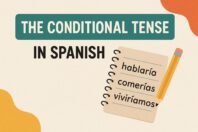Emotions In Spanish: Vocabulary And Verbs To Express Your Feelings

Get our free email course, Shortcut to Conversational.
Have conversations faster, understand people when they speak fast, and other tested tips to learn faster.
More infoWhen it comes to expressing yourself in Spanish conversation, many students feel quite limited at the beginner stages, and this is often due to not knowing vocabulary and verbs for feelings or emotions in Spanish.
If you tend to over-rely on “me gusta” and “no me gusta” when expressing your likes or dislikes, then it’s likely that you are neglecting these verbs.
In fact, this post will provide you with a list of essential verbs to help you express love, likes, joy, happiness, hate, anger, frustration and more.
Ready?
Ok, things are about to get emotional.
Just like English, when we express emotions in Spanish, there are normally two main elements that we need to consider.
- The subject (i.e. person) who likes or dislikes something
- The object or stimulus that triggers the emotion (e.g. a situation, object, animal, person or a certain context).
For example, if you want to say “I love your dog” then,
1) the subject is me
2) the emotion is triggered by your dog.
Therefore, we are left with “me encanta tu perro”, which means “I love your dog”.
Let’s see some more examples.
- I love your dogs – Me encantan tus perros
- I hate these shoes – Yo odio estos zapatos
- I hate cold weather – Yo odio el clima frío
- I don’t like strawberries – No me gustan las fresas
As you may have noticed by now, some Spanish verbs of emotion behave differently to others.
For example, the verb “gustar” which means “to like” places the subject as an indirect object pronoun before the verb and the noun, acting as reflexive verbs.
The most common “Spanish verbs of emotion” that act in the same way are:
| Spanish verb | English Equivalent |
| Encantar | To love / To like very much |
| Fascinar | To fascinate / To love |
| Molestar | To bother / To annoy |
Now the reason that this may be confusing for some English speakers is that when translated directly, the sentence doesn’t make much sense.
For example, if you want to say “I like chocolate” in Spanish, then it would be expressed as “Me gusta el chocolate”, which technically translates as “the chocolate pleases me”.
Once you stop translating word for word and try to think in Spanish, this will be second nature to you.
Let’s see more examples.
- They like classical music – Les gusta la música clásica
- She loves parties – Le encantan las fiestas
- I love outdoor activities – Me fascinan las actividades al aire libre
- Your attitude bothers me a lot – Tu actitud me molesta mucho / Me molesta mucho tu actitud
(For a more detailed post on the verb gustar and expressing things you like, read here.)
Emotions In Spanish: Commonly Used Verbs
Verbs to talk about happiness
| Infinitive Verb | English Equivalent |
| Amar | To love |
| Querer | To want |
| Encantar | To love |
| Fascinar | To fascinate |
| Desear | To desire |
| Alegrarse | To be glad / To cheer up |
| Gustar | To like |
| Divertirse | To amuse |
| Adorar | To adore |
| Agradar | To please |
| Emocionarse | To thrill |
Examples:
- I love my parents – Yo amo a mis padres
- I love my pets very much – Quiero mucho a mis mascotas
- She loves going out to the park – Le encanta salir al parque
- We are fascinated with this place – Estamos fascinados con este lugar
- We wish you a happy birthday – Te deseamos feliz cumpleaños
- I’m happy to see you’re fine – Me alegra ver que estás bien
- You like him – Tu le gustas a él
- I enjoy watching you cook – Me divierte verte cocinar
- I adore how your hair looks – Adoro como luce tu cabello
- I like to drink coffee alone in the morning – Me agrada tomar café solo en la mañana
- She gets excited every time she talks to her dad – Ella se emociona cada vez que habla con su papá
Verbs to talk about sadness or dislikes
| Infinitive Verb | English Equivalent |
| Aburrirse | To get bored |
| Odiar | To hate |
| Avergonzar | To shame / embarrass |
| Envidiar | To envy |
| Molestar | To bother |
| Fastidiar | To annoy |
| Enojar | To get angry |
| Entristecer | To get sad |
| Atemorizar | To scare |
| Abrumar | To overwhelm |
| Aturdir | To stun, to daze |
Examples
- We get bored at the party – Nos aburrimos en la fiesta
- I hate hunting – Odio la caza
- He is ashamed that I give him hugs in public – Se avergüenza de que le de abrazos en público
- They are only envious of your prize – Ellos solo están envidiosos de tu premio
- It bothers me that you don’t help around the house – Me molesta que no ayudes en la casa
- Don’t bother your grandfather – No fastidien a su abuelo
- I get very angry at people who treat animals badly – Me enoja mucho la gente que trata mal a los animales
- They are sad to see you go – Se entristecen por verte ir
- Insects scare him – Le atemorizan los insectos
- It overwhelms me so much information – Me abruma tanta información
- The music you play stuns all people – La música que pones aturde a todas las personas
Feelings or Emotions In Spanish: Most Common Vocabulary To Know
Now that we covered the most common Spanish verbs for expressing emotion, we can also use adjectives to talk about emotions, whether it’s being in love, happy, grateful or something else.
You’ll notice that many adjectives used to express emotions change gender, depending on the subject.
| Feelings | English Equivalent | Emotion | English Equivalent |
| Amor | Love | Enamorado – Enamorada | In love |
| Celos | Jealousy | Celoso – celosa | Jealous |
| Envidia | Envy | Envidioso – Envidiosa | Envious |
| Agradecimiento | Gratitude | Agradecido – Agradecida | Grateful |
| Preocupación | Concern | Preocupado – Preocupada | Worried |
| Optimismo | Optimism | Optimista | Optimistic |
| Felicidad | Happiness | Feliz | Happy |
| Tristeza | Sadness | Triste | Sad |
| Miedo | Fear | Asustado | Scared, frightened |
| Calma | Calm | Calmado / a | Calm |
| Estrés | Stress | Estresado / a | Stressed |
Below, we’re going to list four common ways to express the above emotions or feelings.
1) Using Estar and Tener
The verb Estar (to be) is used to talk about temporary situations, and in this context, we should remember that it’s also used to express feelings – the same way we use the English equivalent.
However, in Spanish, we also use the verb Tener (to have) to express certain feelings – something we don’t do in English.
Let’s see some examples:
Common Spanish idioms with Estar:
- I’m in love with my husband – Estoy enamorada de mi esposo
- We are grateful for all the help – Estamos agradecidos por toda la ayuda
- I’m happy for you – Estoy muy feliz por tí
- She is very sad now – Ella está muy triste ahora
- He is very jealous of his girlfriend’s friends – Él está muy celoso de los amigos de su novia
- I’m calm – Estoy calmada
- I’m very frightened – Estoy muy asustado
- We are excited – Estamos emocionados
- They are anxious – Están ansiosos
- You are surprised – Tú estás sorprendido(a)
Common Spanish idioms with Tener:
- I have a great concern now, and I can’t think – Tengo una gran preocupación ahora, y no puedo pensar
- We must have a lot of optimism to achieve the goals – Debemos tener mucho optimismo para lograr las metas
- We watched a horror movie and now we are afraid – Vimos una película de terror y ahora tenemos miedo
- I have a lot of stress in my work – Tengo mucho estrés en mi trabajo
So how do you know which verb to use in order to express emotions?
The rule to remember is :
- Tener is used with nouns
- Estar is used with adjectives
To clarify this, let’s re-examine nouns vs adjectives
A noun is a word that has meaning on its own and classifies a state of being. In Spanish, nouns can vary in gender and number. Let’s see some examples of nouns that are used to express feelings.
- Joy – Alegría
- Happiness – Felicidad
- Sadness – Tristeza
- Fear/s – Miedo/s
- Anguish – Angustia
- Pain/s – Dolor/es
- Hambre – Hunger
- Thirst – Sed
- Heat – Calor
- Cold – Frío
On the other hand, adjectives are words that describe people’s characteristics and moods, but also emotions, which is relevant for this post. Some of these also change according to gender.
- Happy – Feliz
- Sad – Triste
- Mad – Enojado/a
- Cheerful – Alegre
- In love – Enamorado/a
- Calmed down – Calmado/a
- Bored – Aburrido/a
- Disappointed – Decepcionado/a
- Thirsty – Sediento/a
- In pain / Sore – Adolorido/a
With that quick explanation out of the way, let’s see some more specific examples.
Estar
Used with adjectives to describe emotional states that could change in time, such as:
- I’m happy
- Correct: Estoy feliz
- Incorrect: Tengo Feliz
- He/She is sad
- Correct: Está triste
- Incorrect: Tengo triste
- We are ashamed
- Correct: Estamos avergonzados
- Incorrect: Tenemos avergonzados
- You are calm
- Correct: Estás calmado
- Incorrect: Tienes calmado
Tener
On the other hand, Tener can be used for a state of being, or emotions as a noun.
- I’m scared
- Correct: Tengo miedo
- Incorrect: Estoy miedo
- Be Calm
- Correct: Ten calma
- Incorrect: Este calma
- We hope that everything goes well
- Correct: Tenemos esperanza de que todo salga bien
- Incorrect: Estamos esperanza de que todo salga bien
- I’m nervous because of the final exam
- Correct: Tengo nervios por el examen final
- Incorrect: Estoy nervios por el examen final
Below are the most common uses of Tener to express feelings or emotions:
- To be afraid of + verb in its infinitive form – Tener miedo de
- To be afraid of + noun – Tener miedo a
- To be hungry – Tener hambre
- To be sleepy – Tener sueño
- To be cold – Tener frío
- To be hot – Tener calor
- To be thirsty – Tener sed
- To be anxious – Tener ansiedad
- To be successful – Tener éxito
- To be jealous – Tener celos
- To careful – Tener cuidado
- To be ashamed – Tener vergüenza
- To be in the mood for – Tener ganas de
- To be calm – Tener calma
- To have hope – Tener esperanza
- To be nervous – Tener nervios
2) Verb Sentir + Reflexive Pronouns
Using the reflexive verb Sentirse (to feel) is another common way to talk about feelings in Spanish.
If you’re not familiar with reflexive pronouns, then you should read here.
In the case of Sentir, all you need to do is use a simple formula: Possessive or personal pronoun + verb Sentir conjugated + feeling/emotion
Now with some examples:
- I feel good – Me siento bien
- I feel bad – Me siento mal
- I feel in love – Me siento enamorada
- She feels envious of her long hair – Ella siente envidia de su cabello largo
- We feel grateful – Nos sentimos agradecidos
- I feel happy – Me siento feliz
- She feels worried – Se siente preocupada
- They feel optimistics – Se sienten optimistas
- I feel sad – Me siento triste
- I am scared – Siento miedo / Tengo miedo
- We feel a lot of calm being here – Sentimos mucha calma estando aquí
- He always feels stressed – Él siempre se siente estresado
3) Express Emotions With The Subjunctive
If you never studied the subjunctive, then a two-second recap is that we use subjunctive mood when expressing desires, possible outcomes, doubts and above all, emotions.
Of course, if you’re new to the subjunctive, then make sure to read our Spanish subjunctive simplified for beginners post here.
And now, let’s see some examples of the subjunctive being used to talk about feelings and desires.
- I’m surprised you’re here – Me sorprende que ustedes estén aquí
- I love that you came to the party – Me encanta que hayas venido a la fiesta
- We are so angry that we have waited so many hours – Nos da rabia que hayamos esperado tantas horas
- She hates that her friends are drunk – Ella odia que sus amigos estén borrachos
- It bothers me that people are not punctual – Me molesta que las personas no sean puntuales
- It’s a pity you can’t come with us – Es una lástima que no puedas venir con nosotros
- It’s wonderful that you’re pregnant – Es maravilloso que estés embarazada
- I would love that you behave this night – Me encantaría que te comportaras esta noche
- It is very sad that immigrants suffer so much – Es muy triste que los inmigrantes sufran tanto
- It’s ridiculous that they ask so much money for that house – Es ridículo que pidan tanto dinero por esa casa
4) Using The verb Dar (to give) To Express Emotion
And finally, we finish with a Spanish idiom that has no clear explanation, but it is commonly used by Spanish native speakers.
We conjugate the verb Dar to express an emotion that we are feeling.
For example:
- Te da pena hablar en público
The literal translation is “it gives you shame to talk in public”, but it actually means “you’re embarrassed to speak in public”.
Just as we saw earlier, the verb Dar is used as reflexive one, with the subject coming first as a direct object pronoun.
Some common examples:
| Spanish Sentence | Literal English Translation | Actual English Meaning |
| Me da miedo ese perro | It gives me fear that dog | That dog scares me |
| te da pena hablar en inglés | It gives you shame to talk in English | You’re embarrassed to talk in English |
| Nos da alegría estar aquí | It gives us joy to be here | It makes us happy to be here |
Emotions In Spanish: Practice
- Choose which sentence in subjunctive is correct. Correct if necessary
- Es muy triste que nuestros amigos se están divorciando
- Me da miedo que me roben
- Me molesta que la gente bote basura en la calle
- No me gusta que me dicen mentiras
2) Choose the right emotion for every sentence
- Me ______ que seas tan gracioso (divierte / interesa)
- A ella le dan _____ las arañas ( celos / miedo)
- A los niños les _____ tener fiestas de pijama (encanta / molesta)
- Me _____ el humo del cigarro ( calma / molesta)
3) Fill the blank space
- Me _____ mucho las películas graciosas (I really like funny movies)
- Nos _____ la cultura japonesa (We are interested in Japanese culture)
- Le da _____ que su novio hable con otras mujeres (It makes her jealous that her boyfriend talks to other women)
- Trabajar bajo presión causa mucho _____ (Working under pressure causes a lot of stress)
- Mis abuelos aún están ______ (My grandparents are still in love)
- Se _____ de las lecturas de poesía (They get bored by poetry readings)
- Me _____ mucho la violencia contra los niños (I’m very angry about violence against children)
Emotions In Spanish: Answers
1) Choose which sentence is correct. Correct if necessary
- Es muy triste que nuestros amigos se hayan divorciado
- Me da miedo que me roben
- Me molesta que la gente bote basura en la calle
- No me gusta que me digan mentiras
3) Choose the right emotion for every sentence
- Me divierte que seas tan gracioso
- A ella le dan miedo las arañas
- A los niños les encanta tener fiestas de pijama
- Me molesta el humo del cigarro
3) Fill the blank space
- Me gustan mucho las películas graciosas
- Nos interesa la cultura japonesa
- Le da celos que su novio hable con otras mujeres
- Trabajar bajo presión causa mucho estrés
- Mis abuelos aún están enamorados
- Les aburre las lecturas de poesía
- Me enoja mucho la violencia contra los niños



